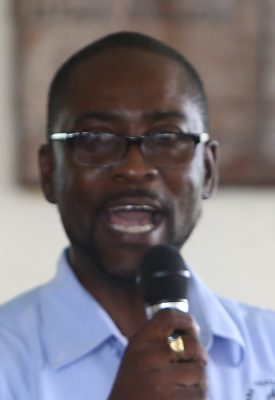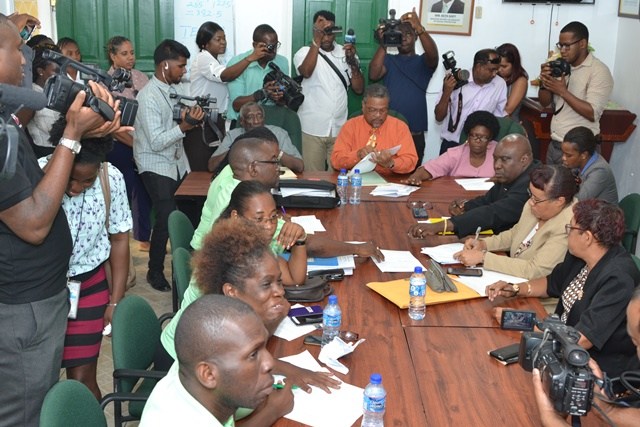-union accuses ministry of stalling
Attempts to set up an arbitration panel to settle the wage dispute between the Guyana Teachers’ Union (GTU) and the Ministry of Education (MoE) fell apart yesterday after the two sides failed to agree on a Chairman.
According to GTU General Secretary Coretta McDonald, the union proposed former Minister of Foreign Affairs Rashleigh Jackson, former Minister of Education Jeffrey Thomas and Dr Aubrey Armstrong as possible chairs, but they were all rejected “without reason” by ministry representatives. Armstrong is best known for his chairmanship of the 1999 Arbitration Tribunal between the Guyana Public Service Union, the Federated Union of Government Employees and the Government of Guyana.
McDonald revealed that MoE, for its part, proposed Permanent Secretary of the Ministry of Public Telecommunications Derrick Cummings, and Glendon Harris, the Human Resources Manager of the Guyana Revenue Authority.

According to GTU President Mark Lyte, these men were rejected by the union on the basis that they are serving members of the public service, hence government functionaries. Therefore, to select either as chair is to create a situation of conflict of interest, he said.
“Our nominees were rejected with no reason, just ‘we can’t accept’. These men have a long sheet of credentials so you can’t reject them without reason. In essence, they can’t make a decision or don’t want to make a decision and their nominees are government functionaries. We can’t have government functionaries chairing this panel,” Lyte asserted.
In light of this, McDonald questioned whether the government was serious about a resolution, while Lyte expressed the opinion that the Ministry’s representatives were attempting to stall the process. “It is discouraging that the ministry would put forward names that the smallest child would reject as unsuitable. It seems to be an attempt to stall the process or frustrate us. It really seemed as if the representatives were trying to play games,” he declared.
Lyte also indicated that the Terms of Reference (ToR) for the panel have been finalised with the wording of contentious clauses making it possible for the union to submit the report from the High Level Task Force and the last two multi-year agreements. President David Granger has previously called the report “deficient” and indicated that negotiations must go back to the drawing board.
Following a meeting on Tuesday, the MoE and GTU agreed to a “feasible timeline” but the union was concerned about two clauses proposed by the Ministry.
According to Lyte, the union found these clauses a “bit loose” and believed they needed to be further tightened for the Tribunal to have a clear idea of what they are deciding especially in relation to what would constitute evidence. Following legal consultation, the union was able to have the wording changed to reflect that “any document parties deem fit to present will be deemed part of the evidence.”
The one and a half hour meeting was therefore viewed as successful for the union, which will consult its executive council next Wednesday on the way forward.
Since 2015, the union has been attempting to negotiate a multi-year salary and non-salary benefit package with the APNU+AFC government but negotiations have dragged on. An October, 2017 breakdown in negotiations and a declaration by the union that its members would proceed on strike led to an intervention by President Granger, who set up a High Level Task Force to continue negotiations and reach a consensus.
The Task Force met for five months and recommended that Cabinet consider granting teachers a 40% increase on 2015 salaries and a 5% increase for each of the four remaining years of the agreement. However, citing the high cost of the recommended increase, $4 billion for teachers and $10 billion if extended to all public servants, the administration rejected the report of the Task Force as deficient.
Teachers were instead offered a $700 million ball park figure for 2018 salary increases. This was rejected and the GTU decided to engage in strike action beginning in the pre-term on August 27th.
The strike action gained momentum on the first day of the school year, with thousands of teachers withdrawing their services and taking to the streets to protest, while the MoE implemented a contingency plan which saw student-teachers, retired teachers and volunteers take to the classrooms.
However, with the number of teachers engaged in strike action increasing every day, the Ministry on September 6th signaled its intention to agree to the union’s demand to proceed to arbitration. Following the agreement to end the strike, teachers returned to work on Monday.
The terms signed on to by the parties to the dispute for resumption indicated that there would be no victimisation by either side, no loss of pay and seniority, and the status quo ante, that is, the conditions in relation to wages, salaries and non-salary benefits which existed before the strike, would prevail.
Most importantly, the terms indicate that within 24 hours after full resumption, the parties will meet to determine the terms of reference for the Arbitration Panel, as guided by the 1990 Memorandum of Agreement between the MoE and the GTU.






